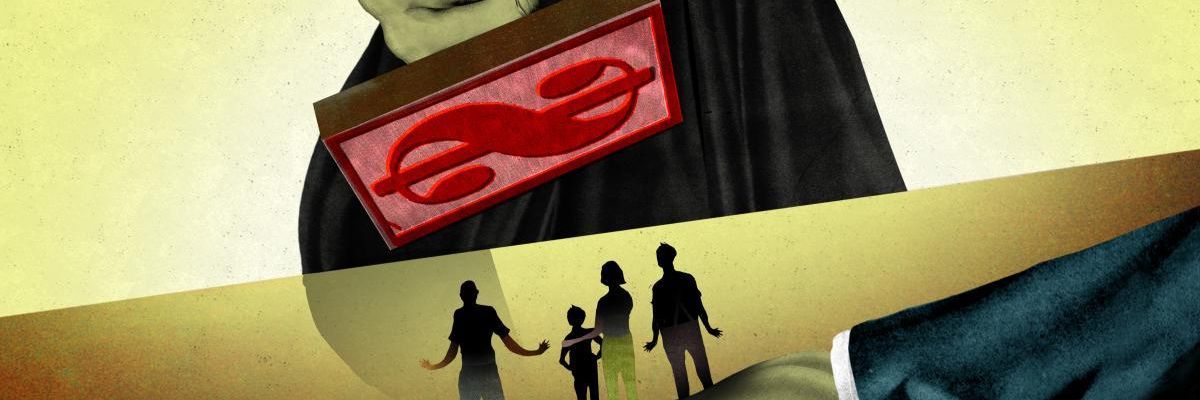Courts across the United States are systematically failing poor and low-income individuals as predatory financial companies buy up large portfolios of past debt and then win profits by targeting vulnerable people who may or may not be responsible for the alleged delinquencies.
That's the key conclusion of an in-depth investigation conducted by Human Right Watch HRW), and published Thursday, which scrutinizes how courts handle hundreds of thousands of lawsuits brought every year by debt buyers - firms that specialize in purchasing bad debts which they then try to collect for themselves.
"Courts should find ways to assist alleged debtors who don't have legal representation instead of stacking the odds still further against them." --Chris Albin-Lackey, Human Rights Watch
The report charges that courts are rubber-stamping lawsuits brought against people by these companies but that due-diligence is woefully lacking and too little is being done to protect the rights of those being sued.
"Courts should be treating debt buyer lawsuits with heightened vigilance," said Chris Albin-Lackey, senior legal adviser at Human Rights Watch. "Rubber stamping debt buyer suits threatens the rights of poor people and ultimately undermines the basic integrity of the courts."
Based on interviews with individuals sued by debt buyers as well as judges, lawyers, public officials, and debt buyer representatives across the country, the group's report--Rubber Stamp Justice: US Courts, Debt Buying Corporations, and the Poor (pdf)--provides abundant evidence of how the poor are being targeted and victimized largely because they find so little recourse or protections once they enter the U.S. court system.
HRW says the scale of the debt buying industry would be hard to overstate, noting how the nation's leading debt buyer firm alone, Encore Capital, claims that one in every five US consumers either owes it money or has owed it money in the past. While a relative handful of large firms dominate the business in the U.S., the group says, there are hundreds and perhaps thousands of companies who buy up delinquent debts at any given time.
A serious concern, the report says, is how debt buyer lawsuits often "rest on a foundation of highly questionable information and evidence" and that, in some cases, "the debt sellers explicitly refuse to warrant that any information they pass on is accurate or even that the debts are legally enforceable."
And though the practices of these companies are deeply troubling by themselves, the larger focus of the report is the manner in which this kind of conduct is consistently allowed, and in many ways fostered, by judges and the broader court system.
According to the report:
The amount at issue in any one debt buyer lawsuit rarely exceeds a few thousand dollars, but the stakes are often higher than they seem. Many of the defendants in these cases are poor or living at the margins of poverty and this is often the reason they fell into debt in the first place. For them, the impact of an adverse judgment can be devastating. Human Rights Watch interviewed alleged debtors in court who broke down in tears while trying to explain how the judgments debt buyers had won against them would impact their ability to pay bills and support their children.
None of this means that debt buyers and other creditors should not be able to enforce their claims in court, but it does mean that courts have clear and compelling reasons to handle debt buyer litigation with a particular degree of vigilance. This report describes how many courts do exactly the opposite, treating debt buyer lawsuits with passive credulity so that their imprimatur is reduced to little more than a rubber stamp. And in addition to smoothing the way for the corporate plaintiffs, many courts have erected formidable obstacles for unrepresented defendants who simply want to have their day in court. These courts risk complicity in damaging the rights of poor people entitled to fair administration of justice and equitable proceedings, and are putting their own integrity at risk.
As the report notes, even when alleged debtors are actually on the "right side of the law" they are typically unable to make an adequate defense of their case against the debt buyers' lawyers. As a result, the lawsuits "typically play out before the courts with a stark inequality of arms, pitting unrepresented defendants against seasoned collections attorneys."
Punctuated with testimony of the those who have been captured between the aggressive tactics of the debt buyer firms and the seeming indifference of the courts, the report highlights interviews with alleged debtors who described struggling to pay utility bills, buy food, or secure basic needs for their children because of adverse judgments related to debts they may not have even be responsible for.
"I don't have money for my baby's diapers," said a single mother interviewed in a Detroit courthouse. She told HRW that a debt buyer had won a judgment against her in a case she never received proper notice of and had no opportunity to answer. "My lights and gas is off right now. My paycheck is about $300 a week and sometimes I only bring home $220. I can't afford [the garnishment] out of my check."
Albin-Lackey said this systematic injustice and mistreatment, especially when it comes to the court's role, must come to an end.
"Courts should find ways to assist alleged debtors who don't have legal representation instead of stacking the odds still further against them," he said. "Debt buying corporations should not be entitled to judgments en masse without evidence simply because defendants fail to mount an effective defense in court."

